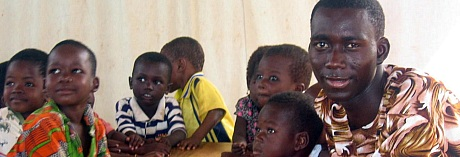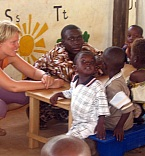

Two Dutch volunteers, Sibrenne Wagenaar and Margriet Schut, in cooperation with CID Ghana have set up a pre-school in northern Ghana for the children of two small communities. In no time there was a flood of enrolments for the pre-school, and within five months from its inception there were about 95 pupils aged 3 to 6. Two teachers have been hired and trained, there is a school committee, and parents' meetings have been organized. The school is also a Nutrition Center and offers the children 2 meals a day.
The school is supported by CID Ghana and by Dutch volunteers. With the help of friends, approximately 500 euros were collected for supplies and materials: mats to sit on, books, pens and paper, cement to finish the building, wooden blocks, toys. And until December 2004 there was money for the salary of one of the teachers.
Sibrenne has been in contact with the Ghanan Education Service and has received approval from the Ghanan government for a structural contribution to the school, provided it can function under its 'own power' until September 2005.To do that, a second professional teacher and an assistant must be hired, the costs of which amount to 500 Euros for a year. Friends of Margriet have donated 100 Euros.
These efforts inspired Moments of Joy to finance the remaining 400 Euros for the 2005 school year. It is expected that the success of the school - partly due to the "start-up contribution" - will grow from a pre-school into a primary school.
What is a school day like?
The following is part of a report by Sibrenne:
About seven-thirty the first children leave their homes. They carry a bowl on their heads and a stick in their hand for the fire; dawdling, meeting other children along the way, they walk to school. Children who arrive at school are asked to sweep the floor. The drinking water container is cleaned, wash basins are set out and the classes are set up with tables, benches, school boards and mats for the littlest ones.
At eight-thirty 'assembly' begins: the children stand in four rows and sing the Ghanan national anthem and the Our Father. They end with 'We are marching to our classes' and march in place as they sing. And so, they rush and stumble into class. Since last week there are tables and benches, beautiful blue benches, which makes the room very cheerful. At this point there is something of a fight for the best places, but we hope to establish some structure in the near future (coloured tables, ribbons around their necks - typical Dutch pedagogic ideas).
Since January 2005 there are two teachers: Salchi, who has been trained to work with young children and Mary: both are very enthusiastic and loving. Often the school day starts with singing, which the children adore. They have already learned a large repertoire of songs, complete with movements (for example 'The lion has a tail'). Whether they know what they are singing is another matter, but ah, what does it matter. After the singing, 1 group (about 50 children) starts on group work. The arrival of tables and benches has made this easier. There is a block corner under the tree; there is a sandbox with buckets and sprinkling cans; there is a playroom with cars, stuffed animals, dolls, etc. You see amazing developments in these corners: children learning to play. First they walked around with the cars on their heads, but little by little they discovered other things to do with them. Through play they start to talk more, make contact, laugh and visibly enjoy themselves: they loosen up and are concentrated in their activities. It is wonderful to see. These 'corners' are supervised by older children. There are a lot of children in the village about 12 years old who do not go to school but would like to be able to. We have involved a couple of them in the school: work with us, learn with us and eat with us in exchange for a helping hand. This is a great success!
There is also a table for drawing and a table to practice the larger motor skill movements for writing. The children beam when they get to use colours. What they make is real, it is palpable; they show what they have made and are proud of it. We also have such games as memory, sorting and the like, but we will have to see how much they will be used without the influence of westerners. They are very good exercises for children, but they require a great deal of guidance, which we are not sure the Ghanese will take on as a matter of course.
About 10 o'clock there is porridge, a cup full, which you only get if you have washed your hands - we hope. It is quite an undertaking for the children, and sometimes they are quite a mess when they come back to the class; some children have porridge all over them, but oh well. Before they go back into the 'class' (a meter-high wall) we do a group activity outside. The children stand in an enormous circle with Mary in the middle to lead. First a song and then an exercise: 'Change your sign, Let it be' After that they go back into the class. The other group now starts on the group work. About 12 o'clock the children are tired and droopy. This is the hardest moment for the teachers to keep them going: storytelling, singing, rhythms, clapping are appropriate activities. It is also a matter of just 'waiting' for lunch; that is one of the things the children come for.
Every week two different women make the meal so that the women in the villages learn how to cook more nutritious meals. The children are not developing as they should; the food they get at home is not at all varied: porridge in the morning, tizet for lunch and dinner, day in day out. As a result, half of the children are too small and thin for their age. You see a lot of distended stomachs from malnutrition. At twelve-thirty lunch is usually ready; once again it begins with the ritual of hand-washing, then you have to find your own bowl with your food. Some of the children find a spot in the shade to eat their lunch, but others put the bowl on their heads and walk home.
In addition to the school staff there is a school committee, made up of the wise old men of the two villages. They are responsible for such 'task areas' as cooking, the contribution (a small amount per child), the construction and maintenance of the school, the teachers, parents' meeting, etc. We have the impression that they really feel involved; in the last week they started to ask questions about the next steps. That is nice to see and we hope that interesting initiatives will result.
One wonderful experience was the parents' meeting that we held. At least 80 people (fathers, mothers and many babies) attended. The chief opened the meeting with fine and important words for the communities. School topics were discussed and the school was given a name: TUNG TEEYA. This is a plant that matures with a great deal of attention, and once mature spreads out in all directions, finally to yield a calabash. It is a wonderful name. At the end of the meeting the children sing their repertoire of songs for their parents. They are terribly proud and receive enthusiastic applause.
TOTAL € 500,--
€ 100,- WAS DONATED BY FRIENDS OF THE VOLUNTEERS, MOMENTS OF JOY SPONSORED THE REMAINING € 400,-.



